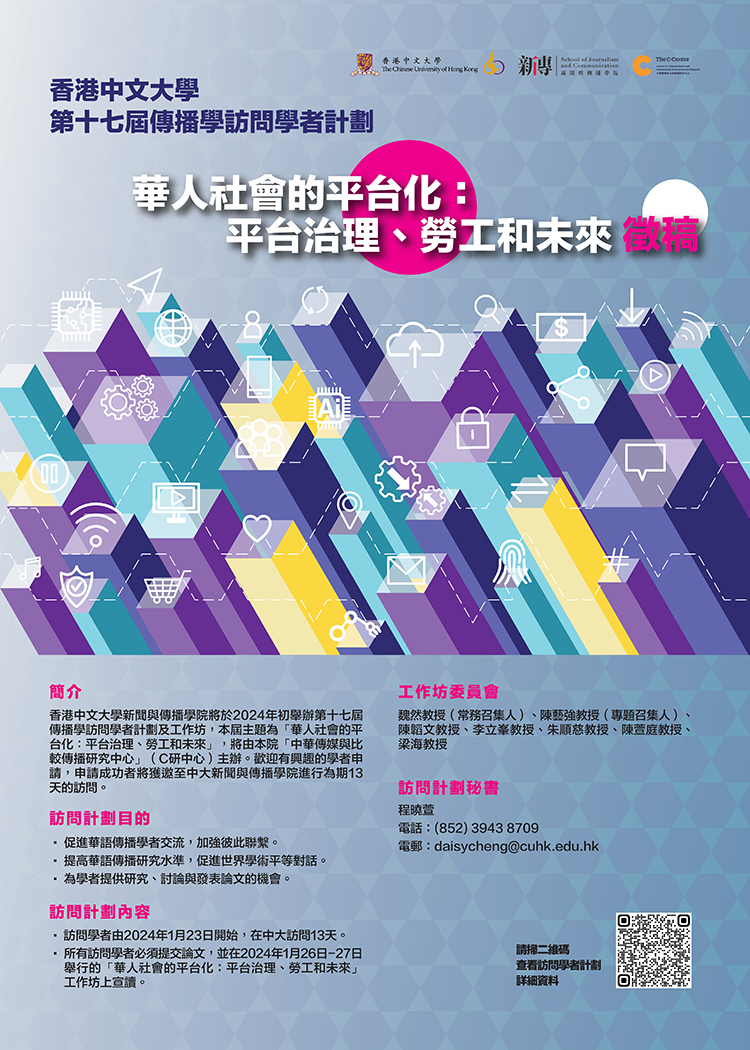The Chinese University of Hong Kong Communication Visiting Scholar Program 2024
"Platformization in Chinese Societies: Governance, Labor, and Futures" Workshop

Introduction
The School of Journalism and Communication at the Chinese University of Hong Kong has been organizing the annual Communication Visiting Scholar Program since 2008. The Program aims to promote academic exchange and links among Chinese-speaking scholars in cultural China and improve the quality of research of the Chinese research community. The Centre for Chinese Media and Comparative Communication Research (The C-Centre) of the School of Journalism and Communication will play host to this program in 2024.
Program Theme 2024
Platforms refer to an emerging type of firm which positions itself as a digital intermediary that coordinates interactions between different user groups and relies upon data extraction to gain economic and political power. Platforms have emerged as key players in reconfiguring media and cultural production, transforming the labor process, and contesting regulatory frameworks and institutions. A growing body of literature—including a special issue about the platformization of Chinese society published by the Chinese Journal of Communication (2019)—has problematized the uniformity of platformization across the globe by attending to differences in affordances, governance approaches, and political economies of platforms. Accordingly, the ways that platforms evolve, govern different user groups, shape the labor process, and challenge political governance are deeply embedded in a specific institutional context.
This workshop aims to further investigate platformization in Chinese societies and generate situated knowledge on the following three sub-themes: (1) platform governance; (2) platform labor; and (3) futures of platforms.
Sub-theme 1: Platform Governance
First, critical scholars have argued for a regional and historical approach to study platforms and platformization by exploring the state-market dynamics at different spatial levels (Zhang & Chen, 2022). This regional and historical approach helps to explore how platforms collaborate and wrestle with local and national governments as well as domestic and transnational capital. This sub-theme involves exploring questions such as: How could we historicize and regionalize platformization in Chinese societies? Indeed, Chinese platforms, such as WeChat, Douyin/TikTok, and DiDi, continue to expand their presence in oversea markets and encounter various regulatory regimes. Similarly, foreign platforms encounter similar constraints when they enter the Chinese markets. How do platforms (fail to) adapt to regulatory frameworks in different contexts? How do platforms adopt similar and different strategies to contest state governance in different political economies?
Sub-theme 2: Platform Labor
This theme examines the labor conditions and experiences of platform workers as well as the transformation of platform labor. Topics include but not limited to the impacts of platformization on work and labor; digital/data/algorithmic labor; precarity; the relationship between platforms; intermediary agencies (e.g., multichannel network companies), and workers; the impacts of emerging technology (e.g., conversational AI) on labor relations in the platform economy; labor organization and resistance; and inequalities in platform labor.
Sub-theme 3: Futures of Platforms
This theme invites scholars to envision alternatives to platform capitalism (e.g., how do the promises and challenges of platform cooperativism become intertwined with platformization in Chinese societies?) and future research directions of platform studies. Additionally, platform firms have also articulated different future-oriented visions of platformization in the past decade or so. Indeed, some platforms have already declined or disappeared, and not all envisioned futures have become realized. However, the imagined future can reveal the challenges and aspirations of the society at that time, which allows us to further historicize platform studies. Hence, we also invite scholars to consider the past, present, and future of platforms by examining the discourses about the future of platformization.
This workshop aims to generate critical insights into the historical, cultural, and regulatory trajectories underpinning platformization in Chinese societies. We welcome submissions of both empirical research and theoretical works. We are open to all methodologies. Submissions can be in Chinese or English (all presentations will be in Chinese).
Visiting Period
The visiting scholars participating in the workshop are expected to stay in Hong Kong for 13 days from 23 January 2024 to carry out intensive academic exchange and research. The School will provide a daily living allowance of HK$450 and accommodation for each visiting scholar.
Call-for-Paper
All participants are required to present a paper related to the said theme at the workshop in Chinese. The deadline for the submission of extended abstracts is 15 June 2023 and the full paper submission deadline is 15 October 2023. All submissions should be sent to This email address is being protected from spambots. You need JavaScript enabled to view it. . Please refer to the Chinese version of the workshop pamphlet for details.
The Annual Workshop Committee
Prof. Ran Wei (Standing Convener)
Prof. Oliver Chan (Theme Convener)
Prof. Joseph Chan
Prof. Francis Lee
Prof. Donna Chu
Prof. Hsuan-Ting Chen
Prof. Hai Liang
Enquiry
Dr. Daisy Cheng
Phone: 3943 8709
Email:
This email address is being protected from spambots. You need JavaScript enabled to view it.








